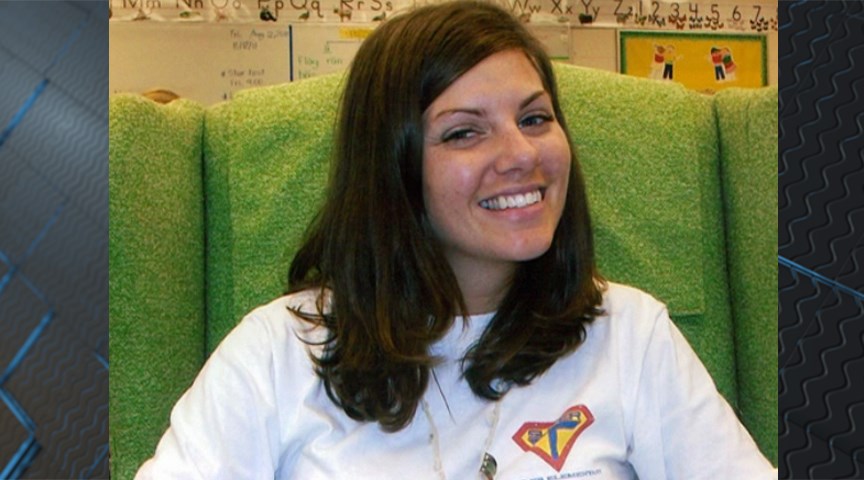CHESTERFIELD, VA (WWBT) -
A Chesterfield mother battling post-partum depression took her own life, after silently suffering for months.
Allison Goldstein’s family is sharing her story, hoping it can save someone else.
When you look at a picture, you'd think Goldstein had a picture perfect life. A loving husband, a beautiful smiling daughter, and a close-knit family. But in her mind, a dark storm was brewing and she was drowning in a battle with post-partum depression.
Goldstein's final words will haunt her family for the rest of their lives.
One day she wrote an email, several pages long, saying good-bye.
She typed out desperate words, that are now a small painful glimpse at just how much she was suffering, in silence.
"I'm so sorry that I didn't know how to describe this pain and seek help" she wrote.
Goldstein typed the email before she signed her daughter into a daycare facility, drove to a dirt road and took her own life.
"To lose your sister and best friend of 32 years and you just didn't see it coming," said Allison’s sister, Mallory Hudson. "I mean without a doubt, you did not see this completely normal new mom to just fall apart so quickly."
And the blow was crushing.
"I never thought I'd have to bury my baby," said her father David Mathews.
"I'm so mad at her,” said Goldstein's mother Carol Mathews. "I feel like she's like a teenager and I'm going to have to ground her. But you know, this was again the psychosis."
Goldstein was suffering from post-partum depression.
It can take forms of anxiety and psychosis as well.
Which is why her family is sharing her death -- the darkest, most difficult moment in their lives -- in hopes that it will save other new moms.
"If this can happen to Allison, it can happen to anybody," said Carol.
And while there may have been warning signs, in many ways this family saw none.
"Just the days before, she was just the happiest, smiling,” said her father.
Goldstein's daughter Ainsley, was a happy and healthy baby. Goldstein's family says she called daily to check in, visit and share updates on the new baby.
By all accounts, her family says, her life appeared normal.
So looking back is hard.
"I wanted red flags,” said Hudson. "I wanted big alerts."
But that bold type of warning they yearn for in hindsight, didn't come. Not that Allison's family saw.
It's why they feel it's so important to reach new moms directly, with a way to get help.
"You know, you are tired!” said Hudson, a mother of 3 herself. "You are exhausted. I mean, you are just plain exhausted. And sometimes it's good and sometimes it's not and you really lose perspective and you really lose sight of what's good about being a mom."
Adrienne Griffen, a founder of post-partum support Virginia, says suicide is the leading cause of death for women in the first year post-partum.
It’s a statistic that makes this discussion critical.
"There is so much emphasis on the baby. It's really important to ask the mom, you know, how are you doing? How are you doing with these changes?"
And all of the experts we spoke to about Allison's story, all of the people who loved and miss her agree -- it's important to talk about post-partum depression and de-stigmatize the shame that seems to be attached to the diagnosis.
"The disease that it is lied to her," said Hudson. "It twisted so many of her memories about being a new mom, a wife -- so many things -- it just lied to her. And it's awful, it's scary, and it happens and it happens so much more often than we realize."
Baby Ainsley is safe and doing well.
Allison's family says they'll share with her as she grows, how much her mother loved her.
Resources for post-partum support:
If you’re overwhelmed, anxious, sad, guilty, irritable, hopeless, or exhausted but can’t sleep- you might have post-partum depression.
According to Postpartum Support Virginia, these feelings affect up to 1 in 5 women during pregnancy or in the first year after giving birth. They are caused by changes in biology, psychology, hormones, and environment. They are treated with some combination of self-care, social support, talk therapy, and medication.
The group says this is the No. 1 complication of pregnancy and child birth.
- National Suicide Prevention life line, 800-273-TALK
This is a free 24/7 service that can provide suicidal persons or those around them with support, information, and local resources.
- Click here for additional resources from group such as the American Foundation for Suicide Prevention, Full Circle and more.
Copyright 2016 WWBT NBC12. All rights reserved.
Report an Error or Submit a Tip to NBC12


 Allison Goldstein (Source: Family photo)
Allison Goldstein (Source: Family photo)